
Haiti is the 83rd most populous country in the world, with an estimated population of 11,123,178 as of July 2018. The last national census in Haiti was done in 2003. Although much of that data has not been released, the population recorded was 8,812,245.
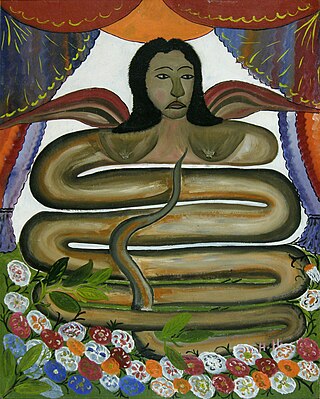
Lwa, also called loa, are spirits in the African diasporic religion of Haitian Vodou and Dominican Vudú. They have also been incorporated into some revivalist forms of Louisiana Voodoo. Many of the lwa derive their identities in part from deities venerated in the traditional religions of West Africa, especially those of the Fon and Yoruba.

Ayida-Weddo, also known as Ayida, Agida, Ayida-Wedo, Aido Quedo, Aido Wedo, Aida Wedo, and Aido Hwedo, is a powerful loa spirit in Vodou, revered in regions across Africa and the Caribbean, namely in Benin, Suriname and Haiti. Known as the "Rainbow Serpent", Ayida-Weddo is the loa of fertility, rainbows, wind, water, fire, wealth, thunder, and snakes. Alongside Damballa, Ayida-Weddo is regarded among the most ancient and significant loa. Considered in many sources as the female half of Damballa's twin spirit, the names Da Ayida Hwedo, Dan Ayida Hwedo, and Dan Aida Wedo have also been used to refer to her. Thought to have existed before the Earth, Ayida-Weddo assisted the creator goddess Mawu-Lisa in the formation of the world, and is responsible for holding together the Earth and heavens. Ayida-Weddo bestows love and well-being upon her followers, teaching fluidity and the connection between body and spirit.

Papa Legba is a lwa, or loa, in West African Vodun and its diasporic derivatives, who serves as the intermediary between God and humanity. He stands at a spiritual crossroads and gives permission to speak with the spirits of Guineé, and is believed to speak all human languages. In Haiti, he is the great elocutioner. Legba facilitates communication, speech, and understanding. He is commonly associated with dogs. Papa Legba is invoked at the beginning of every ceremony. Papa Legba has his origins in the historic West African kingdom of Dahomey, located within present-day Benin.

Erzulie is a family of loa, or spirits, in Vodou.
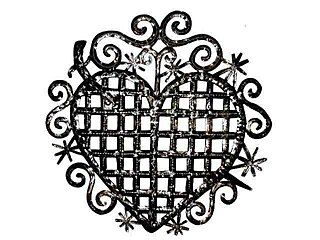
Èzili Dantò or Erzulie Dantor is the main loa or senior spirit of the Petro family in Haitian Vodou. Ezili Danto, or Èzili Dantò, is the "manifestation of Erzulie, the divinity of love." It is said that Ezili Danto has a dark complexion and is maternal in nature. The Ezili are feminine spirits in Haitian Vodou that personify womanhood. The Erzulie is a goddess, spirit, or loa of love in Haitian Voudou. She has several manifestations or incarnations, but most prominent and well-known manifestations are Lasirenn, Erzulie Freda, and Erzulie Dantor. There are spelling variations of Erzulie, the other being Ezili. They are English interpretations of a Creole word, but do not differ in meaning.
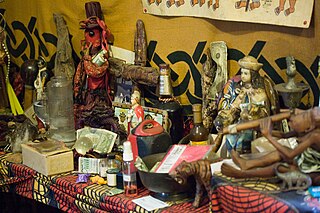
African diaspora religions, also described as Afro-American religions, are a number of related beliefs that developed in the Americas in various nations of the Caribbean, Latin America and the Southern United States. They derive from traditional African religions with some influence from other religious traditions, notably Christianity and Islam.
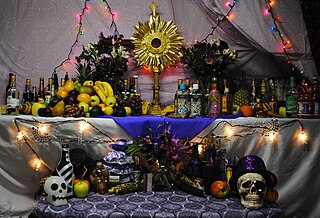
Folk Catholicism can be broadly described as various ethnic expressions and practices of Catholicism intermingled with aspects of folk religion. Practices have varied from place to place and may at times contradict the official doctrines and practices of the Catholic Church.
Loko is a loa, patron of healers and plants, especially trees in the Vodou religion. He is a racine (root) and a rada loa. Among several other loa, he is linked with the poteau mitan or center post in a Vodou peristyle.
A bokor (male) or caplata (female) is a Vodou priest or priestess for hire in Haiti who is said to serve the loa, "'with both hands', practicing for both good and evil." Their practice includes the creation of zombies and of ouangas.
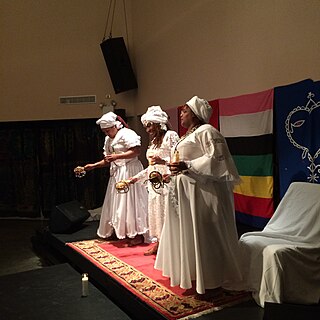
A manbo is a priestess in the Haitian Vodou religion. Haitian Vodou's conceptions of priesthood stem from the religious traditions of enslaved people from Dahomey, in what is today Benin. For instance, the term manbo derives from the Fon word nanbo. Like their West African counterparts, Haitian manbos are female leaders in Vodou temples who perform healing work and guide others during complex rituals. This form of female leadership is prevalent in urban centers such as Port-au-Prince. Typically, there is no hierarchy among manbos and oungans. These priestesses and priests serve as the heads of autonomous religious groups and exert their authority over the devotees or spiritual servants in their hounfo (temples).

Haitian Vodou is an African diasporic religion that developed in Haiti between the 16th and 19th centuries. It arose through a process of syncretism between several traditional religions of West and Central Africa and Roman Catholicism. There is no central authority in control of the religion and much diversity exists among practitioners, who are known as Vodouists, Vodouisants, or Serviteurs.

Christianity is the most widely professed religion in the Dominican Republic. Historically, Catholicism dominated the religious practices of the country, and as the official religion of the state it receives financial support from the government. About 60% of Dominicans identify themselves as Catholic.

Espiritismo is a term used in Latin America and the Caribbean to refer to the popular belief that evolved and less evolved spirits can affect health, luck and other aspects of human life.

Christian-Vodou can be seen as a syncretism of different cultures and religions. Primarily focused on Haitian Vodou and Catholic Christianity, the two have been merging together in a way since around the 18th century, when a majority of Haiti was part of the Atlantic slave trade.
Belie Belcan is a very popular loa within 21 Divisiones and Sansé Espiritismo.

Cécile Fatiman was a Haitian Vodou priestess and revolutionary. Born to an enslaved African woman and a Corsican prince, she lived her early life in slavery, before being drawn to Enlightenment ideals of "liberté, égalité, fraternité" and Haitian Vodou, which shaped her desire to end the institution of slavery in Haiti. Together with Dutty Boukman, she led a Vodou ceremony at Bois Caïman and incited enslaved people to rise up against slavery, in an event that marked the beginning of the Haitian Revolution. She later married fellow revolutionary leader Jean-Louis Pierrot, with whom she had a daughter. She was reported to have lived a long life, dying at the age of 112.

Afro-Haitians or Black Haitians are Haitians who trace their full or partial ancestry to Sub-Saharan Africa. They form the largest racial group in Haiti and together with other Afro-Caribbean groups, the largest racial group in the region.

Dominican Vudú, or Dominican Voodoo, popularly known as Las 21 Divisiones, is a heavily Catholicized syncretic religion of African-Caribbean origin which developed in the former Spanish colony of Santo Domingo on the island of Hispaniola.

Martha Ellen Davis is an emeritus professor from the University of Florida, anthropologist and ethnomusicologist known for her multifarious work on African diasporic religion and music. Professor Davis' research has defied conventional tenets about Haitian and Dominican folk music, and her cultural preservation projects has raised awareness of the significance of the Samaná Americanos' enclave.
















